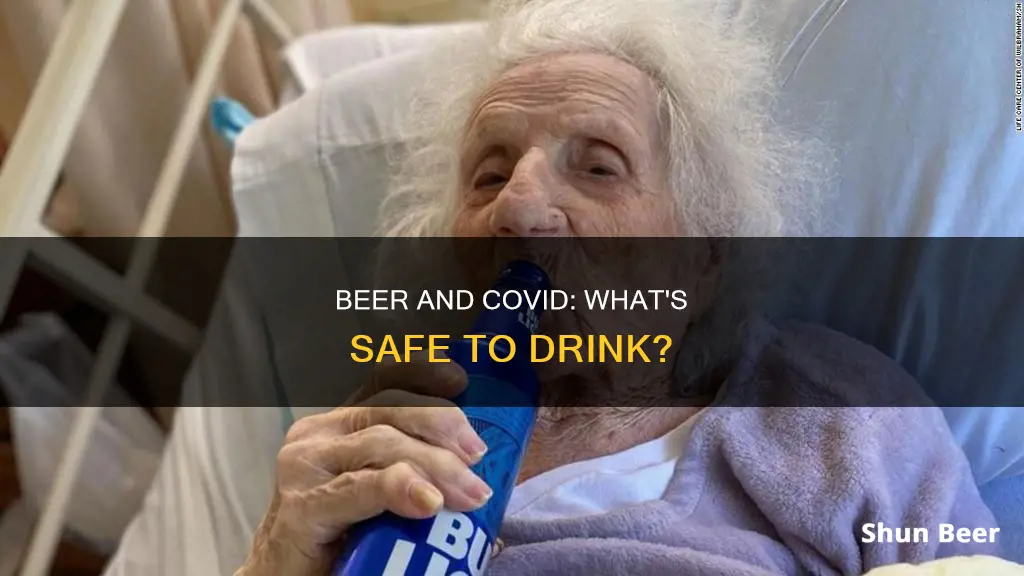
Drinking alcohol while sick with COVID-19 is generally not recommended by doctors and the World Health Organization. Alcohol can cause dehydration, negatively impact your immune system, and impair your mental health. It may also reduce the effectiveness of any medication you are taking. However, some people believe that a drink or two of beer per day is acceptable and will not negatively impact your recovery.
| Characteristics | Values |
|---|---|
| Drinking alcohol with Covid-19 | Not recommended |
| Reason 1 | Alcohol may weaken the immune system, making it harder for the body to fight off Covid-19 |
| Reason 2 | Alcohol may increase the risk of dehydration due to increased urine production and sweating |
| Reason 3 | Alcohol may interact with medications prescribed for Covid-19, reducing their effectiveness |
| Reason 4 | Alcohol may negatively impact mental health, making it more difficult to stay positive and optimistic during recovery |
What You'll Learn

Drinking alcohol with COVID-19 may worsen symptoms
Drinking alcohol while having COVID-19 is not recommended as it may worsen symptoms and increase the risk of developing acute respiratory distress syndrome (ARDS). Alcohol can negatively impact your immune system, making it harder for your body to fight off the virus and potentially leading to more severe symptoms.
The World Health Organization (WHO) has stated that drinking alcohol does not lower the risk of getting COVID-19 but instead increases it. Alcohol consumption can lead to health problems that make you more vulnerable to the virus and its complications. It is important to note that there is no scientific proof that alcohol helps with COVID-19, despite rumors to the contrary.
Alcohol has a significant impact on the immune system, even when consumed in moderate amounts daily. It becomes challenging for the body to defend itself against infections, and you become susceptible not only to COVID-19 but also to other diseases. Therefore, it is advisable to stop drinking alcohol if you are a regular drinker to give your immune system a boost and potentially save your life.
Additionally, alcohol consumption can cause dehydration, which is already a concern during a COVID-19 infection. Alcohol increases urine production and inhibits the body's water balance. It can also cause diarrhea and increased sweating, further contributing to fluid loss. Doctors recommend drinking plenty of water when infected with COVID-19, and alcohol should not be substituted for water.
Lastly, alcohol can impact your mental health and make you feel lost and alone. Staying mentally strong and positive is crucial in fighting any disease, and excessive alcohol consumption can decrease your chances of recovery.
In conclusion, drinking alcohol while having COVID-19 is not advisable as it may worsen symptoms and increase the risk of complications. It is best to avoid alcohol and opt for healthier alternatives like water, coconut water, herbal teas, and vitamin C-rich foods to boost your immune system and aid in your recovery.
Beer and Diabetes: Is Corona Beer Safe for Diabetics?
You may want to see also

Alcohol does not prevent or cure COVID-19
Alcohol consumption is associated with a range of communicable and non-communicable diseases and mental health disorders, which can increase your vulnerability to COVID-19. It compromises the immune system, making it harder for your body to fight off infections and increasing the risk of adverse health outcomes. Additionally, excessive alcohol consumption is a risk factor for many diseases, and it can lead to motor and cognitive impairments, mental health issues, violence, pregnancy complications, and exposure to carcinogens.
The World Health Organization (WHO) has advised that "people should minimize their alcohol consumption at any time, and particularly during the COVID-19 pandemic." This recommendation is due to the negative health consequences of alcohol consumption, which can further increase the risk of developing acute respiratory distress syndrome (ARDS), one of the most severe symptoms of COVID-19.
Therefore, it is important to remember that alcohol does not prevent or cure COVID-19, and excessive alcohol consumption can have detrimental effects on your health, especially during the pandemic.
Mono and Beer: Is It Safe to Drink?
You may want to see also

Alcohol weakens the immune system
Drinking alcohol can alter the makeup of your gut microbiome, which is home to trillions of microorganisms that play crucial roles in maintaining health. Alcohol can affect these microorganisms' ability to support your immune system. Additionally, alcohol may damage the immune cells that line the intestines and serve as the first line of defence against bacteria and viruses. By impairing these cells, it becomes easier for pathogens to enter your bloodstream, making you more susceptible to infections.
Excessive alcohol consumption is linked to a higher risk of pneumonia and other pulmonary diseases. It can also lead to a range of health problems, including high blood pressure, heart disease, liver disease, and an increased risk of cancer. Even a single episode of binge drinking can hinder your immune system. A 2015 study in the journal Alcohol found that binge drinking can reduce infection-fighting white blood cells in the hours after peak intoxication, essentially weakening your immune system.
Moderate alcohol consumption, defined as one drink per day for women and two drinks per day for men, is generally considered safe and is unlikely to negatively affect the immune system. However, it is important to note that alcohol affects females differently than males. Due to biological and chemical factors, females absorb more alcohol and take longer to metabolize it, placing them at higher risk of long-term negative health consequences.
During the COVID-19 pandemic, the World Health Organization (WHO) warned that alcohol consumption can compromise the body's immune system and increase the risk of adverse health outcomes. While alcohol-based hand sanitizers can help prevent the spread of SARS-CoV-2, drinking alcohol does not protect against COVID-19 infection. Instead, consuming high levels of ethanol, especially when contaminated with toxic methanol, can result in severe health consequences, including death.
Beer Drinking in Oklahoma: Sunday's Special Rule
You may want to see also

Alcohol may increase the risk of complications
Firstly, alcohol weakens your immune system, making it harder for your body to fight off the virus. This is because alcohol disrupts immune pathways, impairing your body's ability to defend itself against infection. A weakened immune system also makes you more susceptible to other diseases.
Secondly, alcohol consumption can lead to dehydration. Alcohol inhibits the production of vasopressin, a hormone that regulates the body's water balance, resulting in increased urine production and reduced thirst. This can be particularly problematic when you are suffering from COVID-19, as dehydration can worsen symptoms such as dry cough and fever. Alcohol can also cause diarrhea, increased sweating, and blood vessel widening, leading to further fluid loss.
Thirdly, alcohol can negatively impact your mental health and make it more difficult to stay mentally strong and positive during your illness. Excessive drinking can lead to feelings of sadness and loneliness, reducing your chance of recovery.
Additionally, alcohol may interfere with the effectiveness of medications prescribed to treat COVID-19 symptoms. The liver may prioritise metabolising alcohol over medication, resulting in decreased drug efficacy.
Finally, alcohol consumption is associated with an increased risk of developing acute respiratory distress syndrome (ARDS) during COVID-19 hospitalisation. This may be due to the immune-weakening effects of alcohol, which make you more prone to infectious diseases.
In conclusion, alcohol consumption is not recommended for individuals with COVID-19, as it may increase the risk of complications and negatively impact your health. It is best to avoid alcohol and instead focus on staying hydrated and maintaining a strong immune system to aid your recovery.
Drinking Beer in Public: Texas Law Explained
You may want to see also

Alcohol may cause dehydration
Drinking alcohol when you have COVID-19 is not recommended, as it may cause dehydration. Alcohol consumption can lead to an increase in urination, as it inhibits the production of vasopressin, a hormone that regulates the body's water balance. This can result in a loss of fluids from the body, leaving you dehydrated.
Additionally, alcohol can cause diarrhea, which can further contribute to dehydration. It can also cause blood vessels to widen, leading to increased sweating and fluid loss. Therefore, it is crucial to drink water and stay hydrated when you have COVID-19, and avoid alcohol consumption.
Dehydration can have negative effects on your health, especially when you are sick. It can impact your body's ability to recover and fight off infections. Staying hydrated is essential for maintaining bodily functions and supporting your immune system. When you are dehydrated, your body may struggle to perform at its optimal level, making it more challenging to recover from an illness like COVID-19.
Furthermore, alcohol consumption can impair your immune system, making it harder for your body to fight off the virus. It can also worsen COVID-19 symptoms and increase the risk of developing acute respiratory distress syndrome (ARDS). Alcohol can cause digestive issues, sleep disturbances, and concentration problems, which may exacerbate the symptoms of COVID-19.
It is important to note that there is no scientific evidence that alcohol can cure or prevent COVID-19 infection. In fact, the World Health Organization (WHO) states that drinking alcohol can increase health risks after being infected with the Coronavirus. Therefore, it is advisable to refrain from consuming alcohol if you have COVID-19 and focus on staying hydrated by drinking water and other healthy alternatives.
Non-Alcoholic Beer: A Safe Drink for Crohn's Sufferers?
You may want to see also
Frequently asked questions
Drinking alcohol is not recommended if you have tested positive for COVID-19. Alcohol can have a serious impact on your immune system, increasing your chances of catching COVID-19 and making it harder for your body to fight the infection.
Alcohol can increase the complexity and chances of other health problems. It can cause dehydration, as it increases urine production and reduces your thirst for water. It can also lead to digestive issues, difficulty sleeping, and impaired concentration, which may worsen your COVID-19 symptoms.
Alcohol can weaken your immune system, making it more difficult for your body to fight off the virus. Additionally, alcohol can interact with some medications used to treat COVID-19 symptoms, reducing their effectiveness.
Yes, it is recommended to drink plenty of water to stay hydrated and boost your immune system. Coconut water, herbal teas, and soups are also good options, as they have antibacterial and anti-inflammatory properties that can help soothe your throat and reduce congestion.







